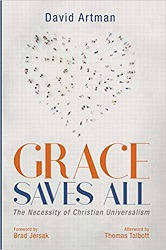
 Grace Saves All
Grace Saves AllThe Necessity of Christian Universalism
Review posted January 18, 2021. Review written January 5, 2021, from my own copy purchased via amazon.com
Wipf & Stock, Eugene, Oregon, 2020. 147 pages.
Starred Review
2020 Sonderbooks Standout:
#3 Christian Nonfiction
I am amassing quite a collection of books about why Christian Universalism is biblical and why it makes sense and why it paints a picture more worthy of God. This is another wonderful addition to that set.
One thing I liked about this one was that I read it in the year it was published, and the author has read almost all the same books I have read – they are even listed in the back as “Recommended Reading” and are cited in many different places. (And I got a few ideas for additional reading.) He even listed all the ones I’d read in the last year, so he’s as up-to-date as I am.
And each book takes its own approach. This book takes the approach of looking at Grace, and I found that lovely. Here’s how the Introduction begins:
Grace is amazing. About this all Christians agree. Yet nearly all forms of Christianity put significant limits on grace. Those forms of Christianity which proclaim that grace alone actually saves typically don’t believe God gives grace to everyone, while those forms of Christianity which proclaim God gives grace to everyone typically don’t believe grace alone actually saves. Is the Christian understanding of grace necessarily divided between these two grace-limiting options? Must grace either be that which saves alone but doesn’t go to all, or that which goes to all but doesn’t save alone? Or, is there another way? Can one be a Christian and understand grace to save alone and go to all? Can one be a Christian and believe salvation by grace alone is for everyone?
I will argue here that being Christian does not require one to limit either grace’s power or scope. It’s quite possible, I will contend, to be Christian and to believe grace is God’s way of finally saving everyone. Grace can be understood to be God’s remedy for all human sin, not just part of it. Grace can mean God perseveres with us until we’ve all seen the light and freely responded in faith. Grace can mean God is with us not just if we get things right, but until we get things right. How long it takes for us to get things right is not the primary issue for God. Whether it happens in this lifetime, or in the age to come, or in the ages to come after that, is not what really matters. The primary issue for God isn’t how hard it will be for us, or how long it will take us. The primary issue for God is our final return home. And, like the father of the prodigal son, God will be vigilant until we all make our way home from the far country.
Even though I will be arguing here that everyone will finally be saved by grace alone, what we do still matters very much. We each still have our part to play. And neither will I be downplaying the consequences of sin. We are granted terrifying freedom to bring tremendous misery upon ourselves and others. What we do matters greatly. But no matter what we do, God’s grace can be understood to include God’s commitment to be with us, even in the form of judgment and hell, until we eventually see the light. I will argue that God’s perfecting love is continually with all of us, through whatever hell may be necessary, until all of us are finally healed and home. What makes grace truly amazing is God never giving up and never failing – God being able to save even those for whom there is apparently no hope. I maintain that it’s possible to be a Christian and to have this understanding of grace.
Unfortunately, most people don’t know it’s possible to be a Christian and to believe grace is God’s way of ultimately saving everyone. They don’t know where to find biblical evidence for this understanding of grace. They don’t know this way of understanding grace was common in early Christianity. They wrongly assume they can only be Christian if they also believe God will not, or might not, save everyone. Through this book I hope to help correct these false impressions and assumptions.
As with all the other books I’ve reviewed on Universalism (see the list on the side of this review page), this author fills the book with biblical references supporting what he says. Universalism is biblical! He also spends a whole chapter talking about how the early church supported Universalism. Universalism is authentic Christianity!
The author calls this kind of belief about grace the Inclusive approach. At the start of the main text, he lays out a five-point biblical framework for this approach:
1. God is a loving parent to all.
2. God sincerely wants to save all.
3. God, in Christ, covers the sin of all.
4. God is sovereign over all.
5. God will be all in all.
This book sums up Christian Universalism simply and clearly in a way that’s easy to understand. Plenty of biblical support is cited, and the author finishes up with his own story of how he came to this view, so it’s got a personal touch as well.
I liked reading this book to have one more clear argument in favor of Christian Universalism. But above all, I was happy to read it because it glories in the amazing inescapable grace of God that indeed saves all. Praise God!
